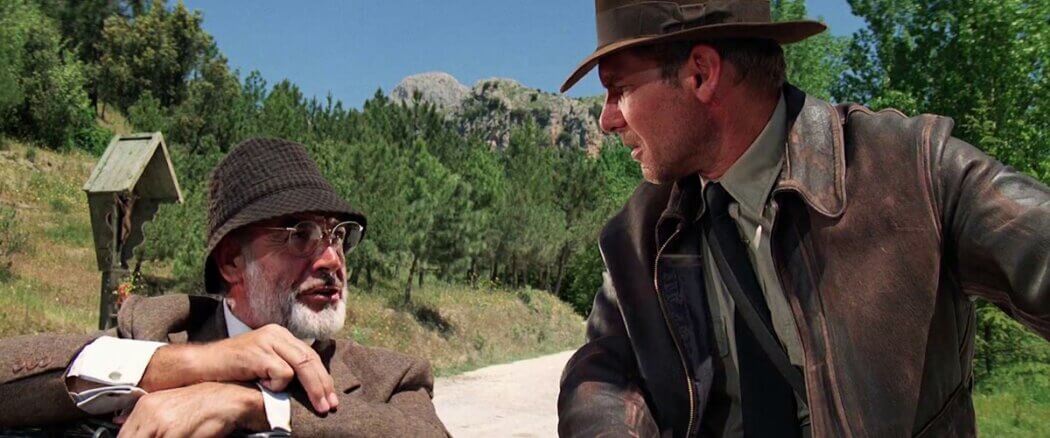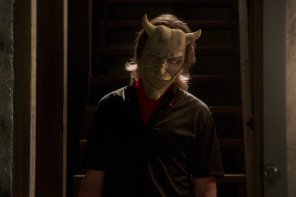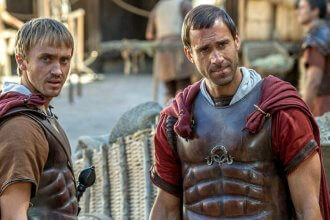In anticipation of The Dial of Destiny, I have been rewatching and reconsidering the Indiana Jones franchise films. I’m a little hesitant about the extent to which James Mangold’s addition to the saga will deliver (For example: what are they going to do without the opening Paramount logo dissolving into some feature in the mise-en-scene?).
One of the things I have noticed in this series is how Indy distinguishes himself from the villains by relinquishing power, as opposed to the Nazis or (in the case of The Kingdom of the Crystal Skull) the Soviets who seek to acquire sacred objects for their own self-justification. From the start, Indy is portrayed as “losing” the very objects his enemies seek to possess – he doesn’t even get to ‘keep’ the idol he finds in the legendary opening scene of The Raiders of the Lost Ark – as his nemesis, Belloq reminds him, “Again we see there is nothing you can possess which I cannot take away.” We see this also in the opening of The Last Crusade in which a young Indiana (River Phoenix) nearly rescues the Cross of Coronado, which “Cortez gave him in 1520”, from a group of rogue explorers, one of whom bears the trademark image by which we have come to know our hero.
Let it go
In Last Crusade’s prologue, we also discover the origins of his signature characteristics including the whip, the fedora, fear of snakes, etc. And while on one level, we are drawn to Indy films by the action sequences, Harrison Ford’s self implemented stunts, the dexterity of the whip, etc., what ultimately makes him heroic is his prioritizing of releasing control. In Raiders, his most significant moment is his (and Marian’s) refusal to behold the ark when it is opened during the penultimate scene; in Crystal Skull, Colonel Dr. Spalko is overtaken (as are the villains in the other films) by her own lust for power, while again Indy fails to acquire the pursued relic; in Last Crusade, his definitive moment occurs when he lets go of the chalice which purportedly once captured the blood of Jesus. What’s notable about this scene however is that he lets it go upon hearing the affirming voice of his father who finally calls him by his preferred name, Indiana.
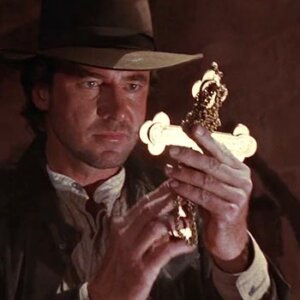 There’s a hilariously adventurous moment early in the film in which Indy crashes into the room where the enemies are holding his father captive. Dr. Henry Jones, Sr. has been abducted due to his possession of a diary detailing the exact location of the holy grail, an artifact the Nazis seek to gain control of the entire world, as Senior Jones gravely warns his son, “the armies of darkness will march all over the face of the earth!”. When Indy arrives, his father initially calls him Junior much to his displeasure. What follows is the unearthing of unresolved father-son tension as we behold several escapes in which Indy clearly attempts to earn his father’s favor through performance. There’s even a brief moment where Dad Jones commends Indy for having found the tomb of the fabled knight, Sir Richard, one of the first steps in recovering the sacred relic. Excitedly, he proclaims, “Junior, you did it!” Indy then ironically validates the very life-commitment to research that he later blames for the rift in their relationship, as he responds, “No, Dad, you did it, forty years…” Their mutual affirmation of one another is short-lived when it is discovered that Indiana has inadvertently introduced peril by bringing the diary within proximity of the Nazis. Dad Jones reverts to sarcasm and judgment as he chides, “I should have mailed it to the Marx Brothers!”
There’s a hilariously adventurous moment early in the film in which Indy crashes into the room where the enemies are holding his father captive. Dr. Henry Jones, Sr. has been abducted due to his possession of a diary detailing the exact location of the holy grail, an artifact the Nazis seek to gain control of the entire world, as Senior Jones gravely warns his son, “the armies of darkness will march all over the face of the earth!”. When Indy arrives, his father initially calls him Junior much to his displeasure. What follows is the unearthing of unresolved father-son tension as we behold several escapes in which Indy clearly attempts to earn his father’s favor through performance. There’s even a brief moment where Dad Jones commends Indy for having found the tomb of the fabled knight, Sir Richard, one of the first steps in recovering the sacred relic. Excitedly, he proclaims, “Junior, you did it!” Indy then ironically validates the very life-commitment to research that he later blames for the rift in their relationship, as he responds, “No, Dad, you did it, forty years…” Their mutual affirmation of one another is short-lived when it is discovered that Indiana has inadvertently introduced peril by bringing the diary within proximity of the Nazis. Dad Jones reverts to sarcasm and judgment as he chides, “I should have mailed it to the Marx Brothers!”
The quest toward a father’s love
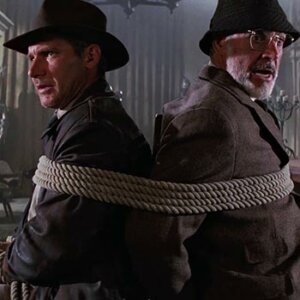 Last Crusade’s prologue affords insight into the roots of their troubled relationship. After having salvaged the Cross of Coronado, Young Indy returns home excitedly to share his discovery with his father – he is seeking his dad’s validation. What he receives instead is indifference as Henry Jones Sr. stops him, calls him Junior, and insists that he “count to 20…in Greek”. What’s notable is that during this scene, we don’t even see the father’s face as his back is literally turned toward his son. In the film’s final act, however, we see a reversal of this dynamic as father and son are separated by physical distance, yet connected as the editing links their pondering of the mysterious ‘three challenges’ one must complete to confirm worthiness of the grail’s possession. We see the inverse of their initially strained relationship as during the passage of the “Word of God” challenge, Indy must alliterate the ‘name of God’…in Latin! In other words, the son is now literally walking in the steps of and identifying with his father’s life work, something he had initially condemned as an unhealthy obsession that took higher priority than their relationship.
Last Crusade’s prologue affords insight into the roots of their troubled relationship. After having salvaged the Cross of Coronado, Young Indy returns home excitedly to share his discovery with his father – he is seeking his dad’s validation. What he receives instead is indifference as Henry Jones Sr. stops him, calls him Junior, and insists that he “count to 20…in Greek”. What’s notable is that during this scene, we don’t even see the father’s face as his back is literally turned toward his son. In the film’s final act, however, we see a reversal of this dynamic as father and son are separated by physical distance, yet connected as the editing links their pondering of the mysterious ‘three challenges’ one must complete to confirm worthiness of the grail’s possession. We see the inverse of their initially strained relationship as during the passage of the “Word of God” challenge, Indy must alliterate the ‘name of God’…in Latin! In other words, the son is now literally walking in the steps of and identifying with his father’s life work, something he had initially condemned as an unhealthy obsession that took higher priority than their relationship.
When we first encounter Henry Jones, Sr. as noted previously, he’s too busy to pay attention to Indy as we can see him engrossed in his lifelong passion of identifying the final resting place of the grail. It’s ironic that Indy felt his dad prioritized work over their relationship and yet he ends up following his dad’s career path in the pursuit of antiquities. We inherit good and bad traits from our dads; their redeeming qualities and their encumbering inconsistencies. Indeed, “the sins of the father” visit us “to the third and fourth generation.”
After his dad ignores him, Young Indy looks to the sheriff (the other male authority figure) to validate what’s ‘right’, but the sheriff defaults to the accusation of the law and calls Indy’s ‘find’ an act of theft. Indy finally takes on the likeness and assumes the very identity of the explorer who validates him, almost anointing him as he places the fedora on his head, indicating, “you lost today, kid, but that doesn’t mean you have to like it”. The prototypical Indy character had previously imparted the words of affirmation, “you got heart, kid…” and even beheld him with a look of admiration when he initially escaped with the pilfered relic. This is what makes the moment when Dad Jones calls him Indiana so significant. We derive identity from whomever or whatever we feel validates us and sees value in who we are and furthermore, what we bring to the table. In the economy of God however, the table is brought to us In Christ, through whom we hear the very same affirmation that was bestowed on Him. Before Jesus had finished the work the Father gave Him to do, He had heard declared, “You are My Son, in you I am well pleased”.
What gave Indiana Jones his identity in the end wasn’t the items related to physical strength or what Robert Capon would call ‘right handed power’, but rather hearing the voice of approval from his father. Thankfully, we do not have to perform great feats to earn our Father’s love. Neither do we have to prove our worth in order to drink from the cup Jesus freely gives. Indeed, by electing us to salvation, “He chose wisely”.

